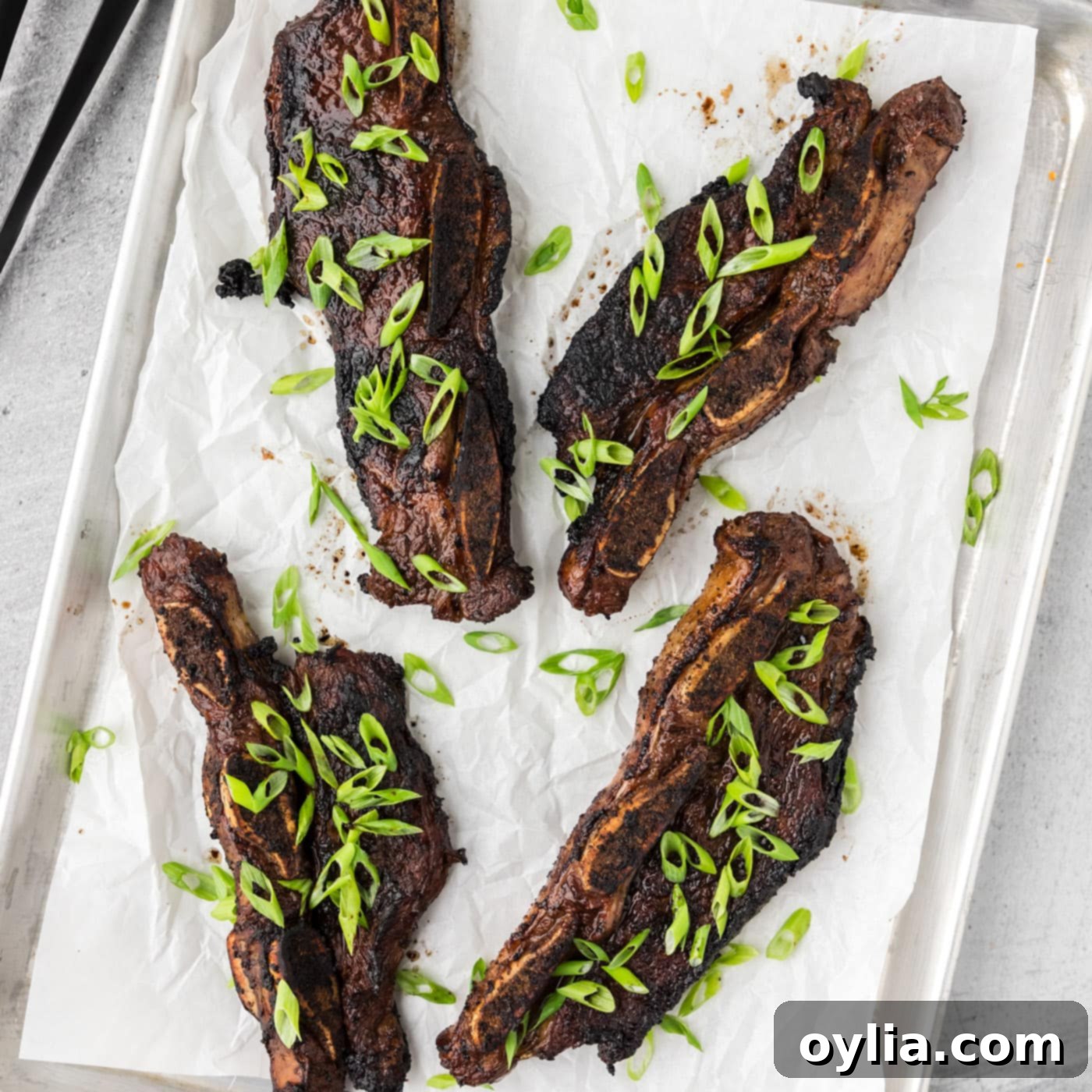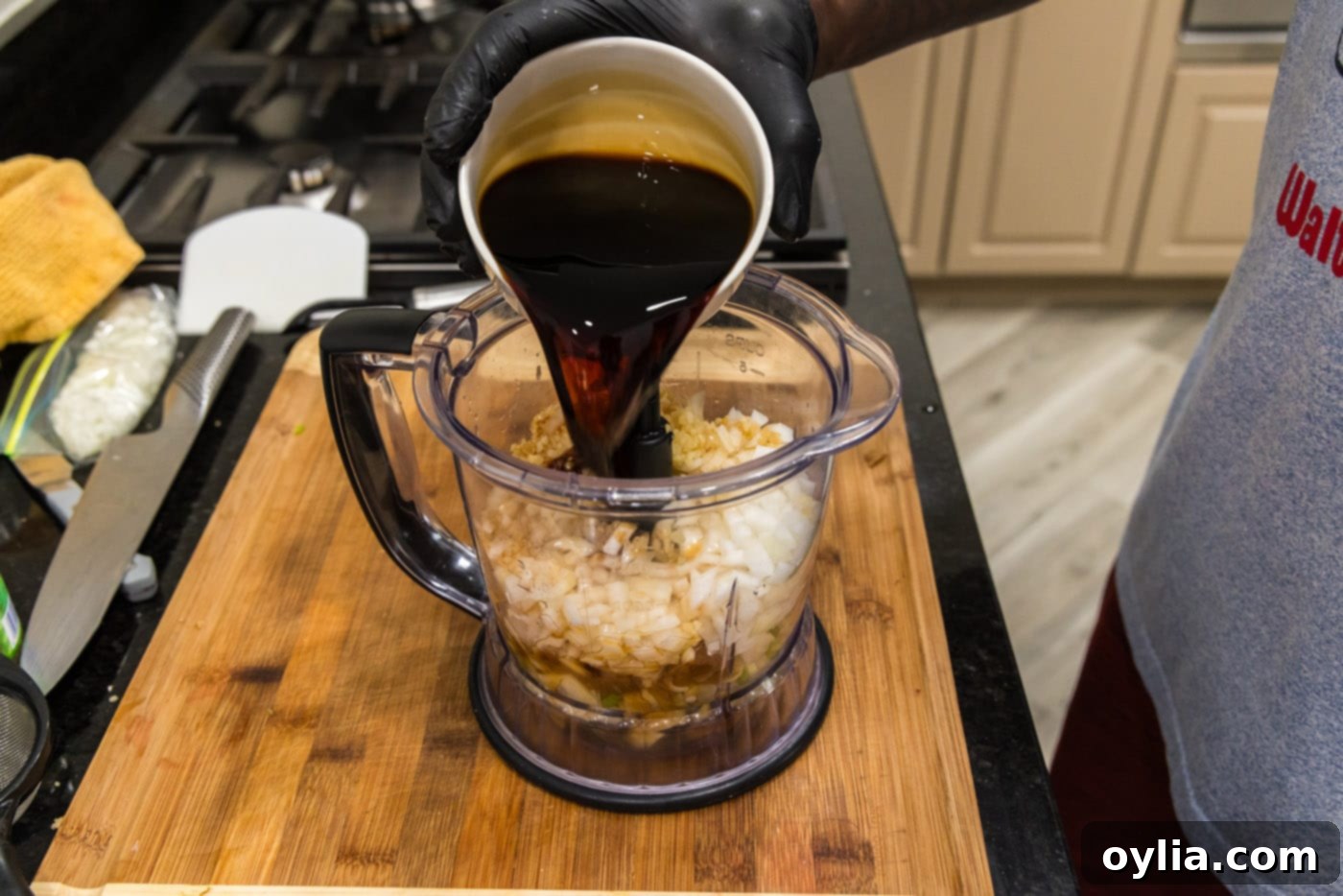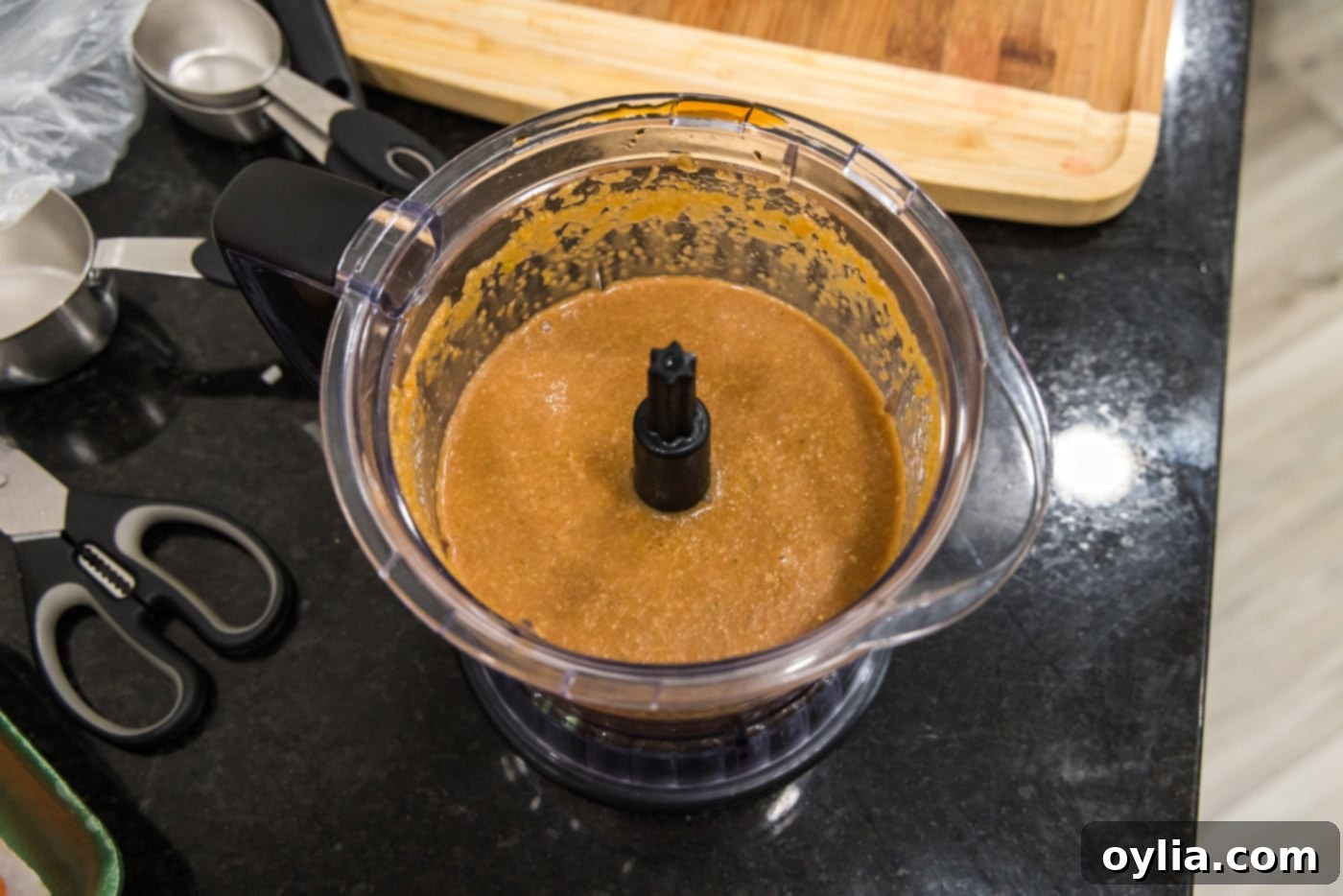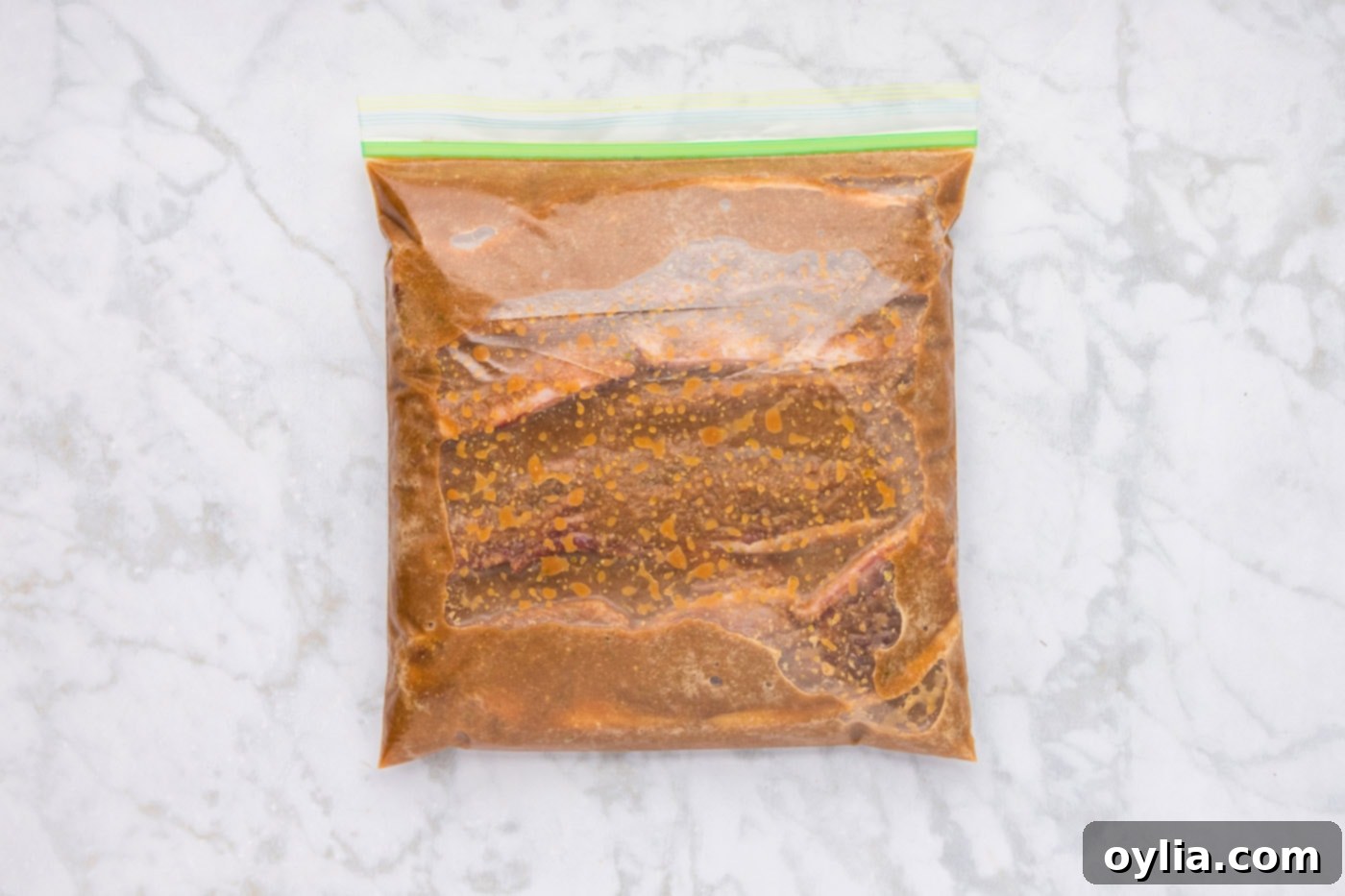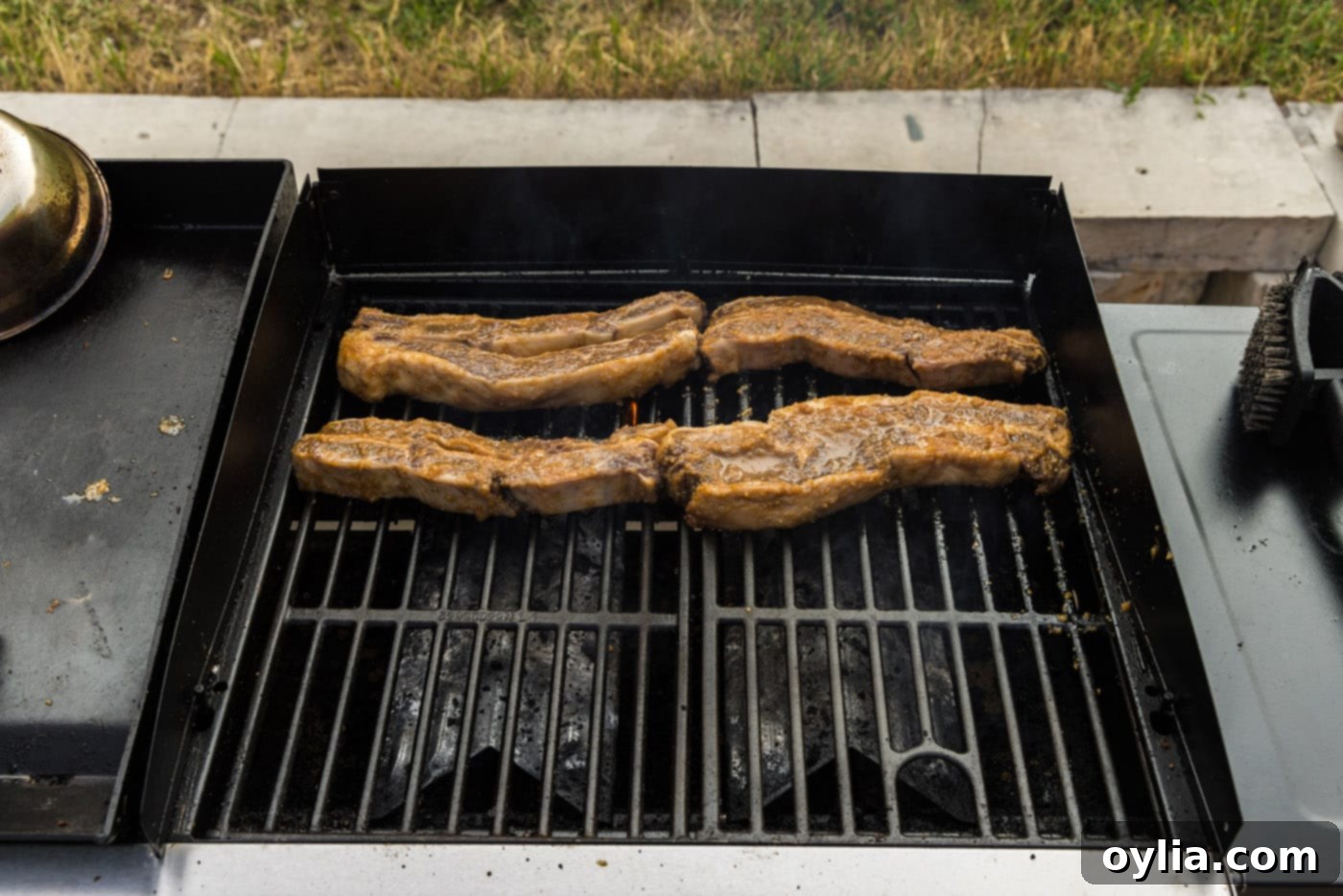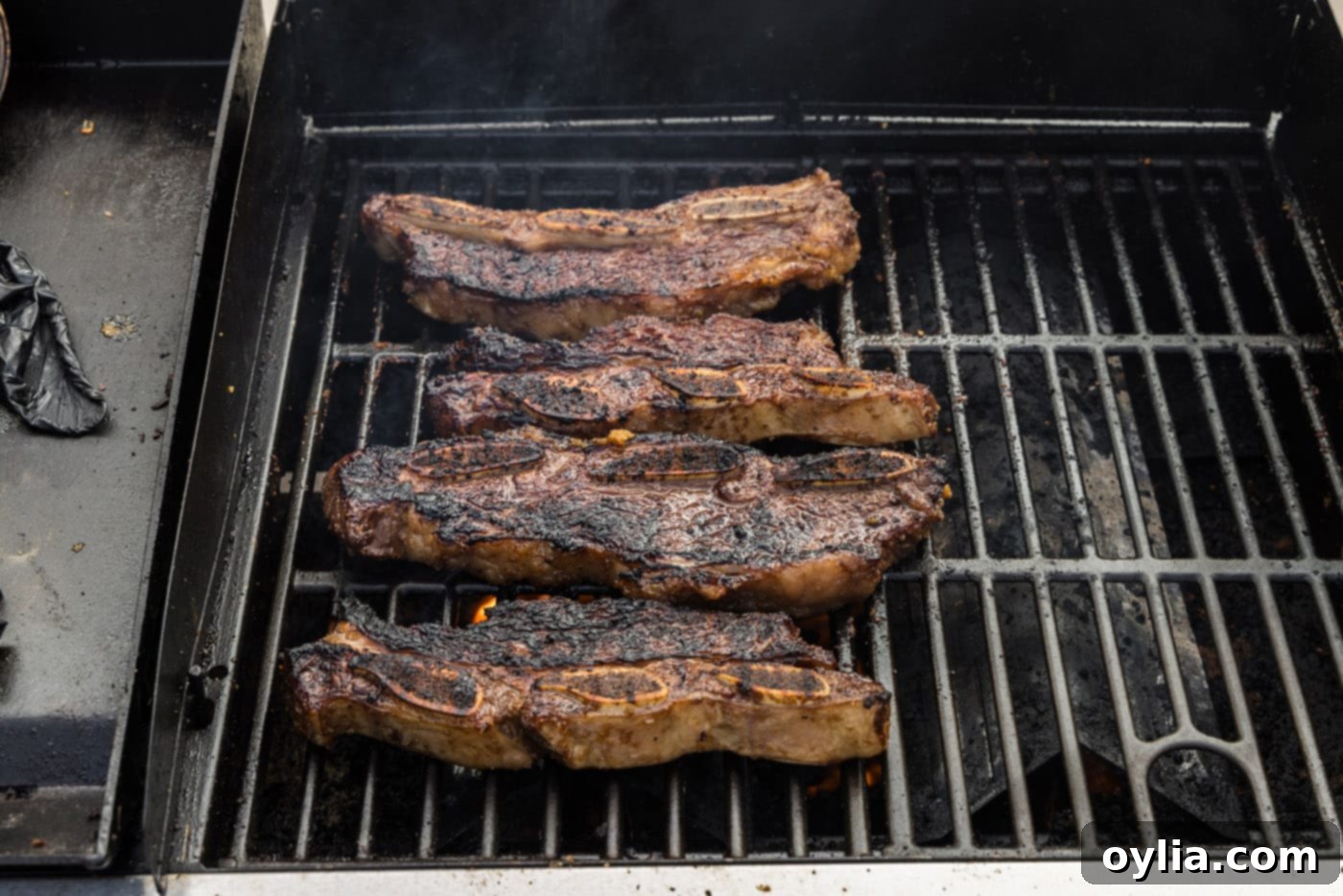Grill Perfect Korean Short Ribs (Galbi/Kalbi): An Authentic & Easy Recipe
Prepare to embark on a culinary journey to Korea right from your backyard grill! These Korean short ribs, known as Galbi or Kalbi, are a testament to the irresistible allure of Korean barbecue. Each thinly sliced beef rib is meticulously marinated overnight in a rich, flavorful concoction of sweet and savory ingredients. From the umami depth of soy sauce to the pungent kick of garlic and onion, balanced by the natural sweetness of pears and brown sugar, this marinade is the secret to their exceptional taste and melt-in-your-mouth tenderness. Once infused with these incredible flavors, the ribs are quickly tossed on a hot grill, charring beautifully to a tender, juicy perfection that will leave your taste buds singing.
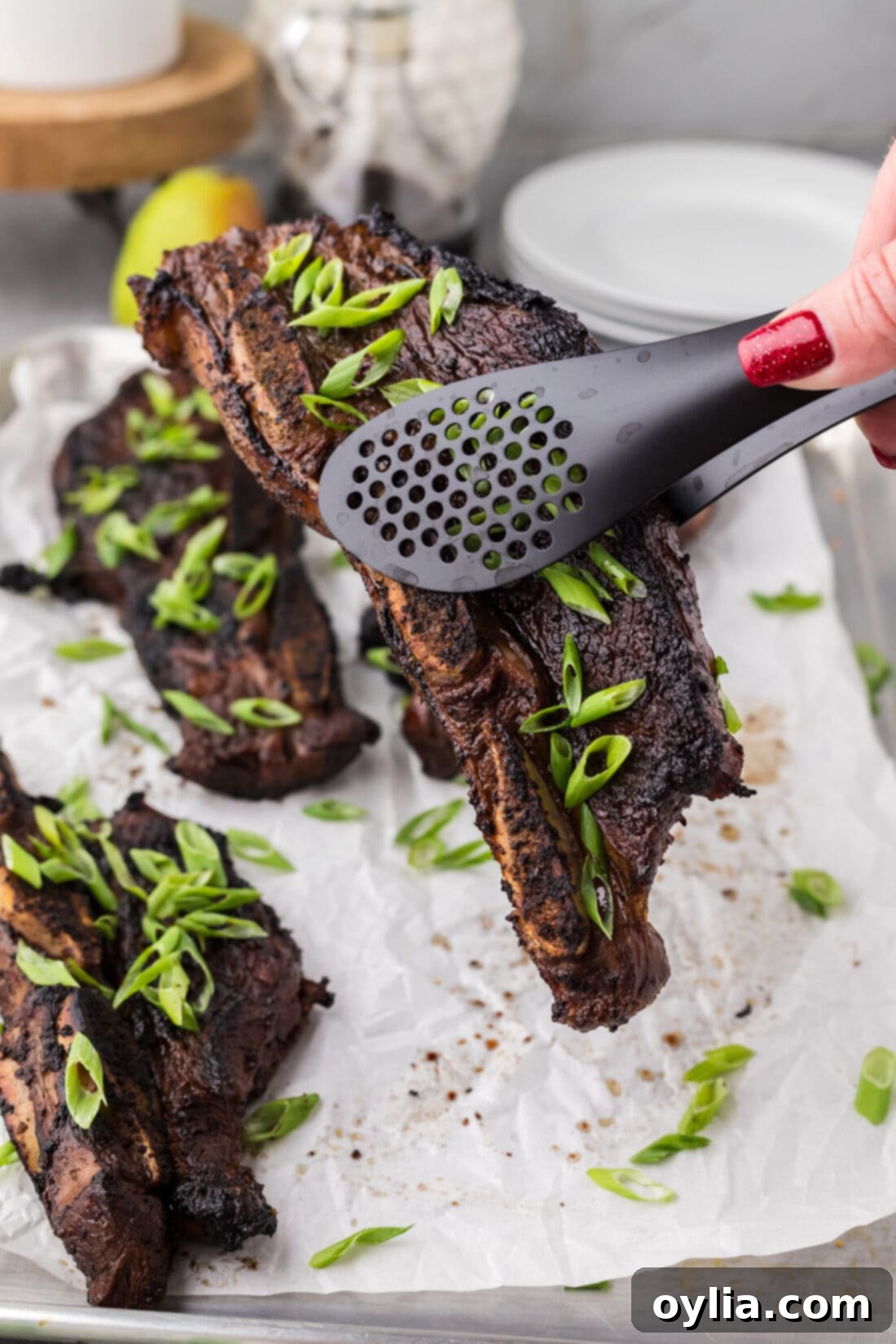
Why This Korean Short Ribs Recipe Works So Well
This Korean short ribs recipe stands out for several compelling reasons, ensuring a truly authentic and delicious result every time. At its heart, Galbi, or Kalbi (Korean for “rib”), masterfully highlights the inherent tender and juicy nature of beef short ribs, elevating them with an intensely flavor-packed marinade. This isn’t just any marinade; it boasts a distinctly Asian flair that penetrates deep into the meat.
The key lies in the cut of meat itself – thinly sliced beef short ribs, typically cut “flanken-style” across the bone. This unique preparation maximizes the surface area, allowing the robust marinade to infuse an unparalleled depth of flavor and moisture. The result is incredibly tender beef that practically melts in your mouth, cooking remarkably quickly on the grill thanks to its thinness. The blend of sweet from brown sugar and pears, savory from soy sauce, and aromatic notes from garlic and onions creates a harmonious balance that is the hallmark of classic Korean BBQ. Furthermore, the natural enzymes in the pear act as a tenderizer, ensuring the ribs are never tough, but always succulently soft.
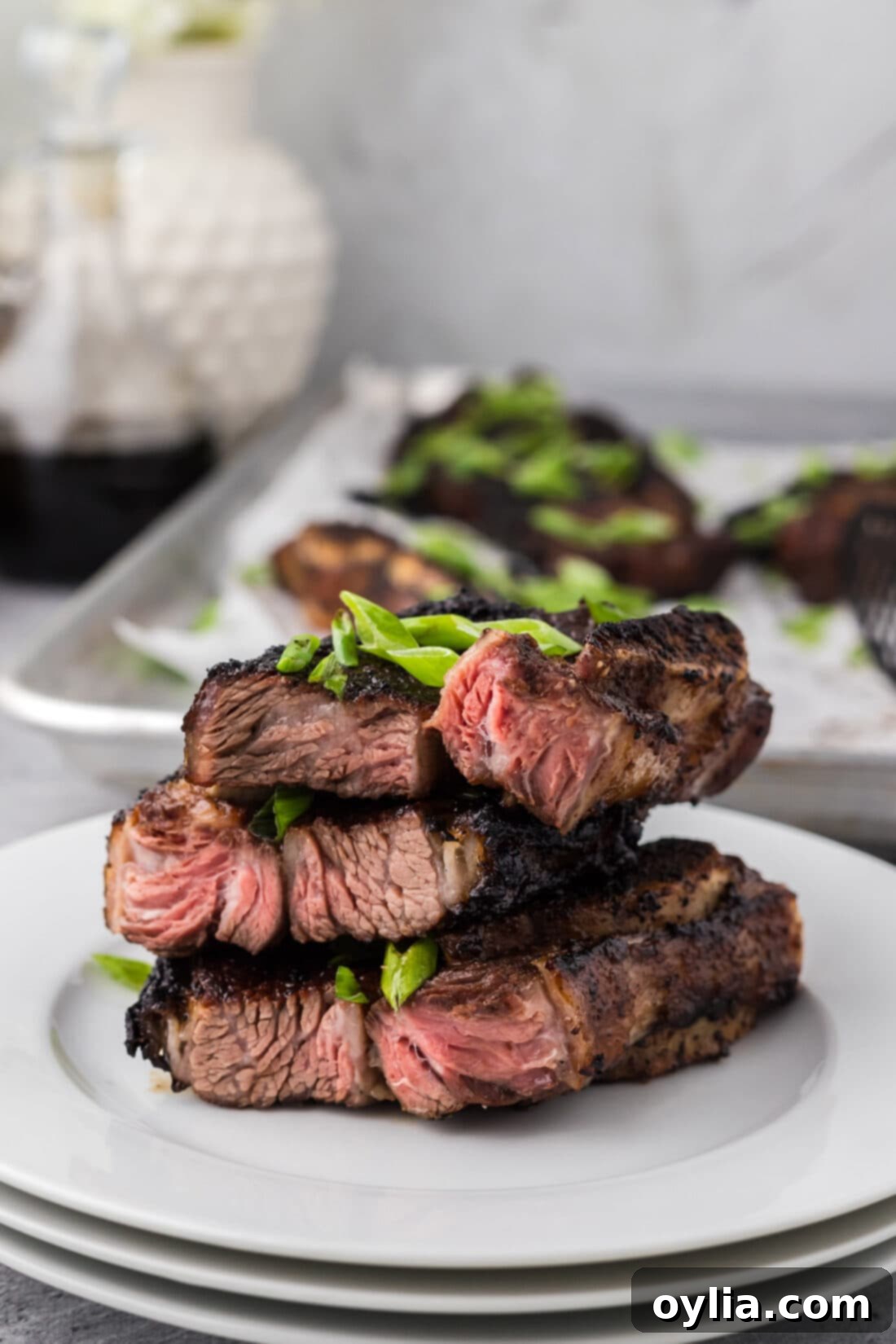
Essential Ingredients for Authentic Korean Short Ribs (Galbi)
To create these mouthwatering Korean short ribs, you’ll need a selection of fresh, high-quality ingredients that contribute to the marinade’s complex flavor profile. All precise measurements and detailed instructions can be found in the printable recipe card located at the end of this post. For now, let’s explore the key components.
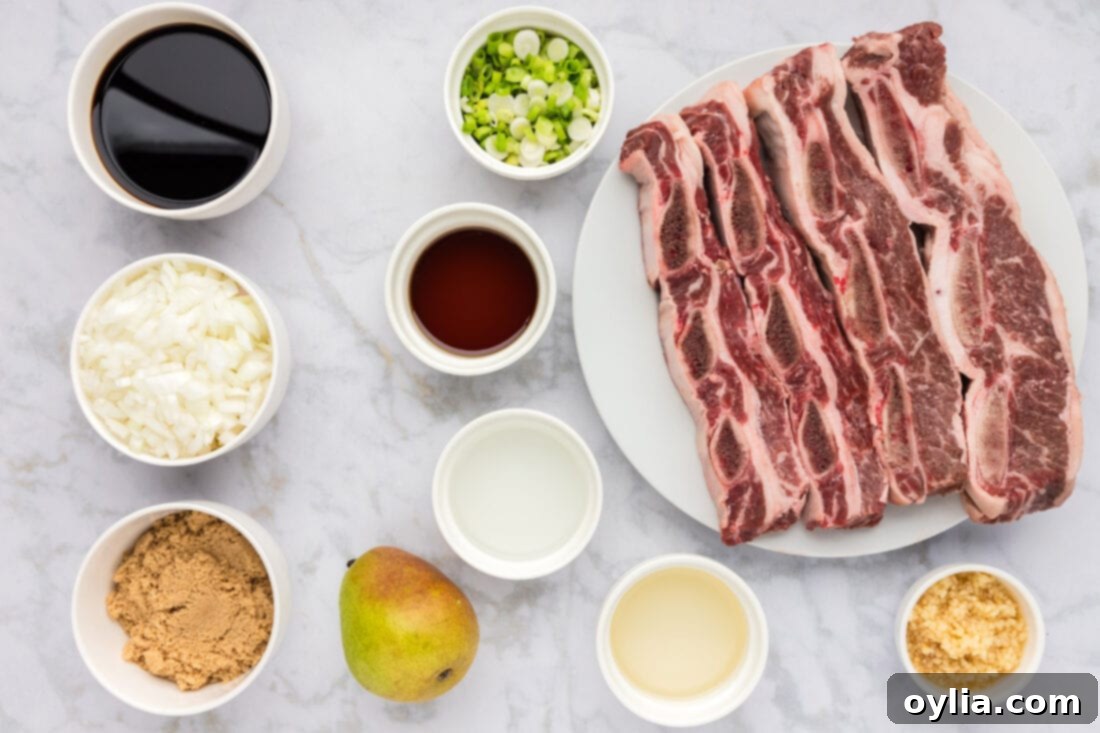
Ingredient Spotlight: Tips for Best Flavor & Texture
Choosing the Right Ribs: Flanken Style for Galbi
RIBS – For this recipe, aim for approximately 3 pounds of beef short rib strips. These are specifically cut across the bone into thin slices, typically about ¼ to ½ inch thick. You might find them labeled as “flanken ribs” or “flanken-style short ribs” at your local grocery store or Asian market. This particular cut is crucial for Galbi, as it allows the marinade to deeply penetrate the meat and ensures quick, even cooking on the grill. If you can’t find flanken cut, you could ask your butcher to slice regular beef short ribs this way. Before marinating, it’s often a good practice to rinse the ribs under cold water to remove any bone fragments, then pat them thoroughly dry with paper towels to ensure better marinade adhesion.
Crafting the Perfect Marinade: A Balance of Flavors and Tenderizers
MARINADE – The marinade is the heart and soul of Korean short ribs, responsible for both flavor and tenderness. Here’s a deeper look at its essential components:
- Pears: These are more than just a sweetener; pears, especially Korean pears (also known as Nashi pears or Asian pears), contain natural enzymes (like bromelain) that act as a tenderizer, breaking down the tough fibers in the beef. If Korean pears are unavailable, regular ripe pears (such as Bosc or Anjou) will work effectively. Their subtle sweetness also beautifully complements the savory elements.
- Soy Sauce: The foundation of the marinade, soy sauce provides a rich umami depth and essential saltiness. Opt for a good quality soy sauce; for a gluten-free option, tamari is an excellent substitute.
- Sesame Oil: This ingredient adds a distinctive nutty aroma and a touch of richness that is quintessential to Korean cuisine. A little goes a long way in imparting a fragrant finish.
- Rice Vinegar: A splash of rice vinegar introduces a mild acidity, balancing the sweetness and richness of the other ingredients. It brightens the overall flavor profile without being overpowering.
- Garlic: Freshly minced garlic is non-negotiable for its pungent, aromatic intensity, a cornerstone of Korean flavors.
- Green Onion (Scallions): We use the white ends of green onions for their milder, sweeter onion flavor, which blends seamlessly into the marinade.
- White Onion: Coarsely chopped white onion contributes a foundational savory sweetness and depth. Like pears, onions also contain mild enzymes that aid in tenderizing.
- Brown Sugar: This provides a deep, molasses-like sweetness that helps in caramelization on the grill, creating those desirable charred edges and a beautiful glaze.
- Water: A small amount of water helps to achieve the right consistency for the marinade, ensuring it evenly coats the ribs.
The magic happens when you blitz all these marinade ingredients together in a blender or food processor until perfectly smooth. This ensures every flavor is thoroughly combined and every inch of the meat is coated with this tenderizing, flavor-packed mixture.
How to Make Perfectly Grilled Korean Short Ribs (Step-by-Step Guide)
These step-by-step photos and detailed instructions are here to help you visualize each stage of making this incredibly flavorful recipe. For your convenience, you can Jump to the Recipe Card at the bottom of this post to access the printable version, complete with precise measurements and comprehensive instructions.
- Prepare the Marinade: Gather all the marinade ingredients and place them into a high-speed blender or a food processor. Process on high until the mixture is completely smooth, with no noticeable chunks of onion or pear remaining. A perfectly smooth marinade ensures even flavor distribution and absorption.


- Marinate the Short Ribs: Carefully place the beef short rib strips into a large plastic gallon zip-top bag. Pour the prepared marinade over the ribs, ensuring each piece is thoroughly coated. Seal the bag, pressing out as much air as possible, and gently massage the bag to distribute the marinade evenly. Place the bag in the refrigerator and allow the ribs to marinate for a minimum of 5 hours, or ideally, overnight (up to 24 hours) for maximum flavor and tenderness.

- Preheat the Grill: Before you begin cooking, preheat your grill to medium-high heat, aiming for a temperature around 375°F (190°C). Allow the grill grates to get good and hot. This high heat is crucial for achieving a beautiful sear and preventing the ribs from sticking.
EXPERT TIP: To further prevent sticking and ensure a clean release, it’s highly recommended to oil your grill grates. Achieve this safely by grasping a wadded-up piece of paper towel with a pair of long-handled tongs. Dip the towel in a high-smoke-point oil (like olive, vegetable, or canola oil) and carefully rub the oiled towel across your hot grill grates. Repeat once or twice until the grates are well-oiled.
- Grill to Perfection: One at a time, remove the marinated ribs from the zip-top bag, allowing any excess marinade to drip off. Place the short ribs directly onto the hot, oiled grill grates. Cook for 8-10 minutes on the first side, allowing them to develop a nice char. Using tongs, carefully flip the ribs over and cook for an additional 8-10 minutes on the second side. For optimal caramelization and even cooking, you may find it beneficial to flip the ribs every 4-5 minutes throughout the total cooking time. The goal is beautifully caramelized edges and tender meat.


Frequently Asked Questions & Expert Tips for Galbi Success
Absolutely! In fact, preparing the marinade and allowing the short ribs to soak in it overnight is highly recommended. This extended marination period allows the complex flavors to deeply penetrate the meat and the pear enzymes to work their magic, resulting in exceptionally tender ribs. However, be mindful not to let them marinate for more than 24 hours, as over-marinating can cause the meat fibers to break down too much, leading to a mushy texture. Aim for at least 5 hours, or ideally, up to overnight (12-20 hours) for the perfect balance.
Any leftover Korean short ribs should be stored in an airtight container and kept in the refrigerator. They will remain delicious and safe to eat for 3-4 days. Reheat gently in a pan or microwave to maintain tenderness.
While a charcoal grill often imparts the most authentic smoky flavor, a gas grill works perfectly fine and offers more precise temperature control. The key is to get the grates very hot to achieve a good sear and caramelization on the ribs, regardless of the grill type. Ensure your grill is clean and well-oiled before cooking.
Yes! If you don’t have access to a grill, you can cook these short ribs using other methods. A cast-iron skillet or a heavy-bottomed pan on the stovetop over medium-high heat can mimic the searing effect of a grill. Alternatively, you can broil them in the oven on a baking sheet (watch closely to prevent burning due to the sugar content) or even bake them at a higher temperature, though grilling offers the best char and flavor.
There are a few reasons why your ribs might turn out tough. First, ensure you’re using the correct cut – flanken-style ribs are designed for quick cooking and tenderness. Second, inadequate marination time can prevent the tenderizing enzymes from the pear and onion from fully breaking down the meat fibers. Make sure to marinate for at least 5 hours. Lastly, overcooking can dry out any cut of meat, making it tough. Given their thinness, Korean short ribs cook quickly, so keep an eye on them and avoid excessive grilling time.
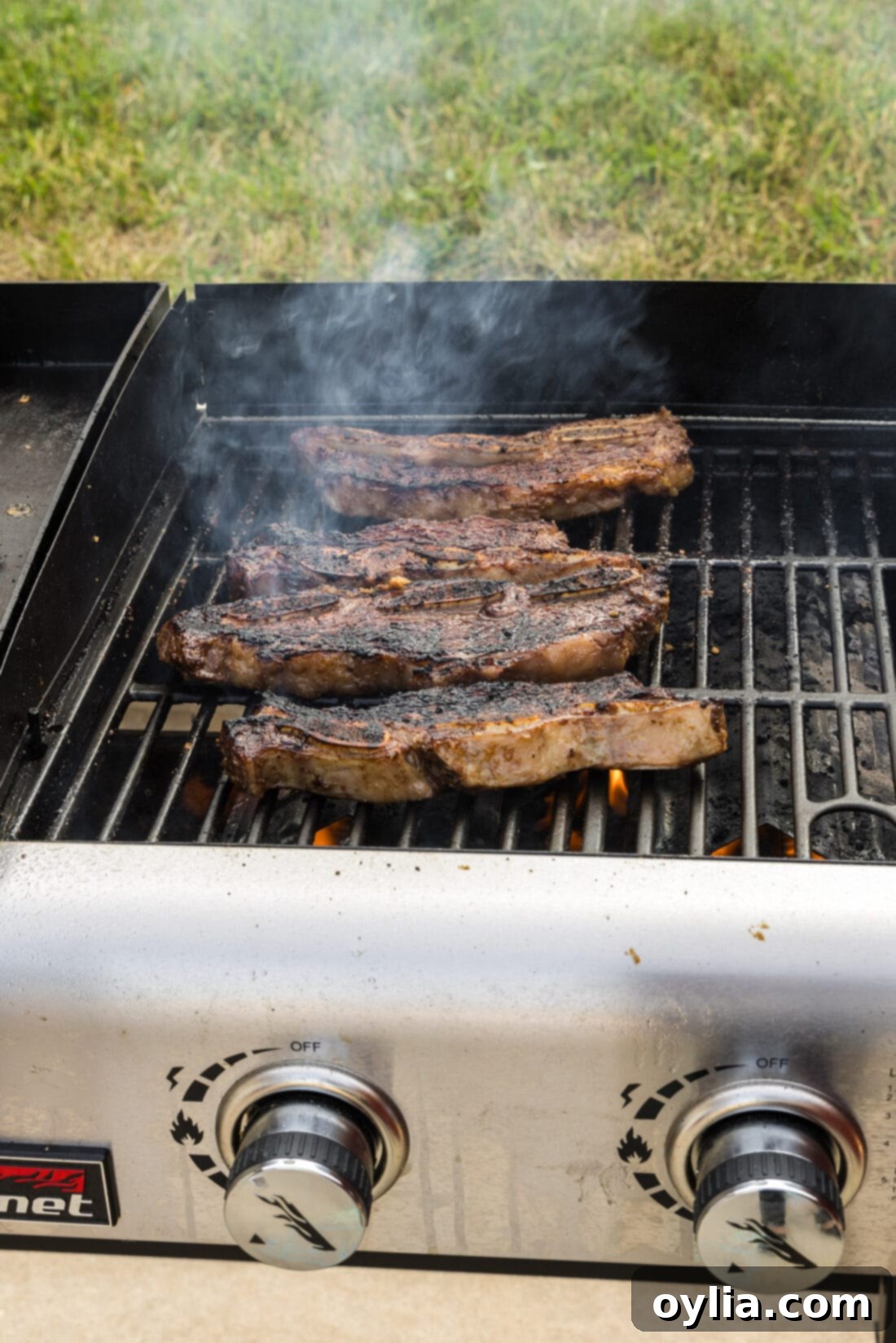
Delicious Serving Suggestions for Your Korean Short Ribs
Korean short ribs are incredibly versatile and pair wonderfully with a variety of side dishes that complement their rich, savory-sweet flavor. For a traditional Korean BBQ experience, serve your perfectly grilled Galbi with fluffy steamed white rice, which acts as a neutral canvas for the intense flavors of the meat. Classic accompaniments include tangy, spicy kimchi and refreshing blanched bean sprouts for added crunch and freshness. For a healthy green, consider sautéed broccoli or try our vibrant Asian Broccoli Salad. Brighten the meal further with a side of quick pickled onions, offering a delightful acidic counterpoint. To enjoy them as a Korean “ssam” (wrap), provide fresh lettuce leaves (such as red leaf or green leaf lettuce) to wrap the meat, rice, and any other desired banchan (side dishes). Finally, a garnish of slivered green onions and a sprinkle of toasted sesame seeds adds both visual appeal and a final layer of aromatic flavor.
More Irresistible Asian-Inspired Recipes
- Beef Bulgogi
- Korean Fried Chicken
- Soy Glazed Eggplant
- Smoked Beef Short Ribs
- Braised Beef Short Ribs
I love to bake and cook and share my kitchen experience with all of you! Remembering to come back each day can be tough, that’s why I offer a convenient newsletter every time a new recipe posts. Simply subscribe and start receiving your free daily recipes!
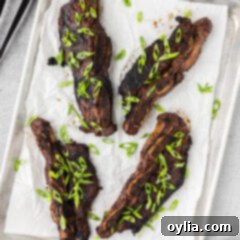
Korean Short Ribs
IMPORTANT – There are often Frequently Asked Questions within the blog post that you may find helpful. Simply scroll back up to read them!
Print It
Pin It
Rate It
Save ItSaved!
Ingredients
- 3 pounds beef short rib strips
Marinade
- ¾ cup soy sauce
- 3 Tablespoons sesame oil
- ¼ cup rice vinegar
- 3 Tablespoons minced garlic
- ¼ cup sliced green onion white ends only
- 1 cup coarsely chopped white onion
- 1 medium pear peeled, cored, coarsely chopped
- ½ cup brown sugar packed
- 3 Tablespoons water
Things You’ll Need
-
Food processor or blender
-
Gallon sized zipper bag
-
Grill
-
Tongs
Before You Begin
- Choose 3 pounds of beef short rib strips at the grocery store. You may also find them named flanken ribs or flanken style. Ensure they are cut thinly across the bone for optimal cooking.
- Bonus points if you can find Korean pear, as its enzymes are highly effective for tenderizing. However, any ripe, firm pear will work in a pinch.
- Always store any leftovers in an air-tight container in the refrigerator for 3-4 days to maintain freshness and prevent spoilage.
Instructions
-
Place all marinade ingredients (soy sauce, sesame oil, rice vinegar, minced garlic, green onion white ends, coarsely chopped white onion, pear, brown sugar, and water) into a blender or food processor. Process until the mixture is completely smooth and free of chunks.
-
Place the 3 pounds of beef short rib strips into a large plastic gallon zip-top bag. Pour the smooth marinade into the bag, ensuring the ribs are fully coated. Seal the bag, removing excess air, and refrigerate to marinate for at least 5 hours, or ideally overnight (up to 24 hours).
-
Preheat your grill over medium-high heat (approximately 375°F / 190°C) until the grates are thoroughly hot.
TIP – For best results and to prevent sticking, oil your grill grates. Use tongs to hold a paper towel dipped in olive or vegetable oil and rub it across the hot grates.
-
Remove the marinated ribs from the bag, letting excess marinade drip off. Place them directly onto the hot grill. Cook for 8-10 minutes per side, flipping every 4-5 minutes for even cooking and char, until beautifully caramelized and tender.
Nutrition
The recipes on this blog are tested with a conventional gas oven and gas stovetop. It’s important to note that some ovens, especially as they age, can cook and bake inconsistently. Using an inexpensive oven thermometer can assure you that your oven is truly heating to the proper temperature. If you use a toaster oven or countertop oven, please keep in mind that they may not distribute heat the same as a conventional full sized oven and you may need to adjust your cooking/baking times. In the case of recipes made with a pressure cooker, air fryer, slow cooker, or other appliance, a link to the appliances we use is listed within each respective recipe. For baking recipes where measurements are given by weight, please note that results may not be the same if cups are used instead, and we can’t guarantee success with that method.
